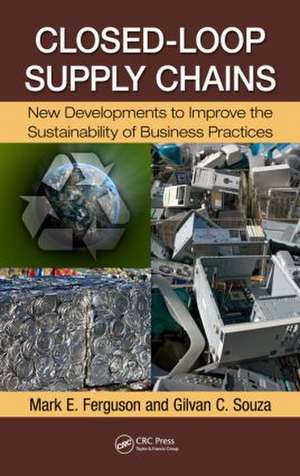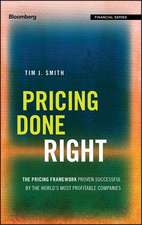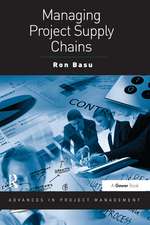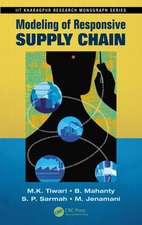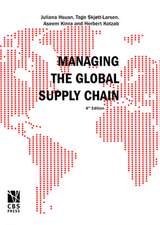Closed-Loop Supply Chains: New Developments to Improve the Sustainability of Business Practices: Supply Chain Integration Modeling, Optimization and Application
Editat de Mark E. Ferguson, Gilvan C. Souzaen Limba Engleză Hardback – 21 apr 2010
Written by academic experts, in language that is accessible to practitioners, this reader-friendly reference examines recent research and case studies of companies running profitable reuse/remanufacture/recycling operations in various industries. It illustrates profitable practices in returned and recovered products, and clearly explains how to: design a reverse logistics network, conduct production planning, implement effective marketing strategies for recovered products, and apply closed-loop supply chain strategies in other industries besides manufacturing.
From product development to materials to assembly and profitability, this authoritative resource illustrates the impact of these processes across all aspects of the supply chain. It provides a business perspective of how to properly implement these processes in your company to achieve profitable and sustainable operations in a more environmentally friendly manner. It also:
- Investigates strategic decisions companies face in regard to the secondary market for their products, including opportunity costs
- Examines tactical issues firms will face once the decision to remanufacture has been made, including how to market remanufactured products
- Summarizes the key characteristics and practices in a variety of industries where remanufacturing has been successful
- Explains how to conceptualize and manage changes due to switching to a closed-loop supply chain
- Demonstrates how to handle changing legislation
Preț: 528.32 lei
Preț vechi: 705.38 lei
-25% Nou
Puncte Express: 792
Preț estimativ în valută:
101.11€ • 104.45$ • 84.15£
101.11€ • 104.45$ • 84.15£
Carte tipărită la comandă
Livrare economică 26 martie-09 aprilie
Preluare comenzi: 021 569.72.76
Specificații
ISBN-13: 9781420095258
ISBN-10: 1420095250
Pagini: 257
Ilustrații: 12 b/w images, 18 tables and Less than 50
Dimensiuni: 156 x 234 x 20 mm
Greutate: 0.65 kg
Ediția:1
Editura: Taylor & Francis
Colecția Auerbach Publications
Seria Supply Chain Integration Modeling, Optimization and Application
Locul publicării:Oxford, United Kingdom
ISBN-10: 1420095250
Pagini: 257
Ilustrații: 12 b/w images, 18 tables and Less than 50
Dimensiuni: 156 x 234 x 20 mm
Greutate: 0.65 kg
Ediția:1
Editura: Taylor & Francis
Colecția Auerbach Publications
Seria Supply Chain Integration Modeling, Optimization and Application
Locul publicării:Oxford, United Kingdom
Public țintă
Professional and Professional Practice & DevelopmentCuprins
A Commentary on Closed Loop Supply Chains. STRATEGIC CONSIDERATIONS. Strategic Issues in Closed Loop Supply Chains with Remanufacturing. Environmental Legislation Regarding Product Take-back and Recovery. Product Design Issues. TACTICAL CONSIDERATIONS. Designing the Reverse Logistics Network. Product Acquisition, Grading, and Disposition Decisions. Production Planning in Remanufacturing. Analyzing the Market for Remanufactured Products. INDUSTRY CHARACTERISTICS AND CASE STUDIES. Examples of Existing Profitable Practices in Product Take-back and Recovery. Reuse and Recycling in the Movie Industry. Reverse Supply Chain in Hospitals: Lessons from Three Case Studies in Montreal. INTERDISCIPLINARY RESEARCH ON CLOSED LOOP SUPPLY CHAINS. Interdisciplinarity in Closed-Loop Supply Chain Management Research. Empirical Studies in Closed-loop Supply Chains: Can We Build a Greener Mousetrap?. Conclusion and Future Research Directions.
Notă biografică
Mark Ferguson is a professor of Management Science and Wilbur S. Smith Distinguished Fellow at the Moore School of Business, University of South Carolina. He received his PhD in Business Administration, with a concentration in Operations Management from Duke University in 2001. He holds a BS in Mechanical Engineering from Virginia Tech and an MS in Industrial Engineering from Georgia Tech. Dr. Ferguson's research interests involve many areas of supply chain management and sustainability including production planning policies for remanufacturing, product line extensions involving remanufactured products, the use of leasing and trade-in policies to recover end-of-use products, and business strategies for responding to secondary markets.
Dr. Ferguson serves as the faculty director for Technology and Management Program (www.mgt.gatech.edu/tm) and the coordinator for the focused research area on dynamic pricing and revenue management (http://mgt.gatech.edu/fac_research/centers_initiatives/pricing/index.html). Two of his papers have won best paper awards from the Production and Operations Management Society and several of his research projects have been funded by the National Science Foundation. Prior to joining Georgia Tech, he had five years of experience as a manufacturing engineer and supply chain manager with IBM.
Gilvan "Gil" Souza is an Associate Professor of Operations Management at the Kelley School of Business, Indiana University. Prior to coming to Kelley, Gil was a tenured associate professor at the University of Maryland. He received a Ph.D. in operations management from UNC, an MBA from Clemson University, and a BS in aeronautical engineering from ITA (Brazil). Prior to entering academic, Gil had about five years of experience in product development and product planning at Volkswagen of Brazil. His research focuses in supply chain management, remanufacturing, and sustainable operations. It has been published in all the top journals in the field, and he won the Wickham Skinner Early–Career Research Accomplishments award from POMS in 2004. Gil has taught courses in operations and supply chain management, primarily in MBA and EMBA programs, and he teaches the sustainable operations MBA elective at Kelley.
Dr. Ferguson serves as the faculty director for Technology and Management Program (www.mgt.gatech.edu/tm) and the coordinator for the focused research area on dynamic pricing and revenue management (http://mgt.gatech.edu/fac_research/centers_initiatives/pricing/index.html). Two of his papers have won best paper awards from the Production and Operations Management Society and several of his research projects have been funded by the National Science Foundation. Prior to joining Georgia Tech, he had five years of experience as a manufacturing engineer and supply chain manager with IBM.
Gilvan "Gil" Souza is an Associate Professor of Operations Management at the Kelley School of Business, Indiana University. Prior to coming to Kelley, Gil was a tenured associate professor at the University of Maryland. He received a Ph.D. in operations management from UNC, an MBA from Clemson University, and a BS in aeronautical engineering from ITA (Brazil). Prior to entering academic, Gil had about five years of experience in product development and product planning at Volkswagen of Brazil. His research focuses in supply chain management, remanufacturing, and sustainable operations. It has been published in all the top journals in the field, and he won the Wickham Skinner Early–Career Research Accomplishments award from POMS in 2004. Gil has taught courses in operations and supply chain management, primarily in MBA and EMBA programs, and he teaches the sustainable operations MBA elective at Kelley.
Recenzii
If you have not heard the term Closed-Loop Supply Chains before, chances are that you soon will. As the editors point out, the traditional business model of a manufacturer that involves a take, make, waste approach will soon come to an end, given the increasingly limited availability and higher cost for raw materials. For manufacturers to be successful in the future, they will need to close the loop on their manufacturing process, using fewer and fewer of the earth’s natural resources to make their products.
This process involves reclaiming and reintroducing materials back into the production cycle at the end of their first product life. Not only is this the right thing to do for our environment, customers are increasingly driving this transformation by asking companies to consider the environmental impact of their manufacturing process and by demanding more transparency around a product’s full life cycle.
The authors have done a great job in this book of explaining the key insights from the academic literature on this critically important topic.
From the strategic decisions made at the executive suite down to the tactical decisions of the production floor, this book offers much insight for any manager interested in adopting a more sustainable business model.
--- John R. Wells, President and CEO, Interface Americas
As companies are trying to strike a balance between sustainability and profitability, and as researchers are exploring different reverse logistics and re-manufacturing issues, Ferguson and Souza lay out a clear path for readers to explore strategic, cross-functional, intra/inter-organizational, and tactical issues arising from remanufacturing. Not only does this book provide practical insights through different case studies, it highlights some open research questions for further examination. Each chapter is written in a concise manner without technical jargons by expert(s) in this important field. This book is perfect for anyone who is interested to learn about current practice and research about remanufacturing -- a timely and important topic in the years to come.
--- Christopher S. Tang, Edward W. Carter Professor of Business Administration, UCLA Anderson School.
Despite today’s unpredictable economy, Sustainability remains a topic of strong interest to the business community. In particular, the role of closed loop supply chains and remanufacturing as practical contributors to sustainable industrial practices are attracting global attention. However, in-depth academic research into these subjects as vigorous contributors to Sustainability has been slow to materialize–until now.
I am pleased to report that Closed Loop Supply Chains: New Developments to Improve the Sustainability of Business Practices is an important new addition to the short list of quality publications in this area. Besides offering important coverage of the structure and economics of the current reman industry, the contributors present surprising insights into the business, such as the effect of eBay on the purchase of refurbished/remanufactured goods and why products with "classic" or "timeless" designs have greater potential for longevity through multiple remanufacturing cycles. Useful, readable and highly recommended
--- Dr. Nabil Nasr, Assistant Provost, Director of CIMS & Golisano Sustainability Institute, Rochester Institute of Technology
This process involves reclaiming and reintroducing materials back into the production cycle at the end of their first product life. Not only is this the right thing to do for our environment, customers are increasingly driving this transformation by asking companies to consider the environmental impact of their manufacturing process and by demanding more transparency around a product’s full life cycle.
The authors have done a great job in this book of explaining the key insights from the academic literature on this critically important topic.
From the strategic decisions made at the executive suite down to the tactical decisions of the production floor, this book offers much insight for any manager interested in adopting a more sustainable business model.
--- John R. Wells, President and CEO, Interface Americas
As companies are trying to strike a balance between sustainability and profitability, and as researchers are exploring different reverse logistics and re-manufacturing issues, Ferguson and Souza lay out a clear path for readers to explore strategic, cross-functional, intra/inter-organizational, and tactical issues arising from remanufacturing. Not only does this book provide practical insights through different case studies, it highlights some open research questions for further examination. Each chapter is written in a concise manner without technical jargons by expert(s) in this important field. This book is perfect for anyone who is interested to learn about current practice and research about remanufacturing -- a timely and important topic in the years to come.
--- Christopher S. Tang, Edward W. Carter Professor of Business Administration, UCLA Anderson School.
Despite today’s unpredictable economy, Sustainability remains a topic of strong interest to the business community. In particular, the role of closed loop supply chains and remanufacturing as practical contributors to sustainable industrial practices are attracting global attention. However, in-depth academic research into these subjects as vigorous contributors to Sustainability has been slow to materialize–until now.
I am pleased to report that Closed Loop Supply Chains: New Developments to Improve the Sustainability of Business Practices is an important new addition to the short list of quality publications in this area. Besides offering important coverage of the structure and economics of the current reman industry, the contributors present surprising insights into the business, such as the effect of eBay on the purchase of refurbished/remanufactured goods and why products with "classic" or "timeless" designs have greater potential for longevity through multiple remanufacturing cycles. Useful, readable and highly recommended
--- Dr. Nabil Nasr, Assistant Provost, Director of CIMS & Golisano Sustainability Institute, Rochester Institute of Technology
Descriere
Written by academic experts, in language that is accessible to practitioners, this authoritative resource examines recent research and case studies of companies running profitable reuse/remanufacture operations in various industries. It illustrates profitable practices in returned and recovered products, clearly explaining how to: design a reverse logistics network, conduct production planning, implement effective marketing strategies, and apply closed-loop supply chain strategies in industries besides manufacturing. From product development to materials to assembly and profitability, this complete resource explores the impact of these processes across all aspects of the supply chain.
